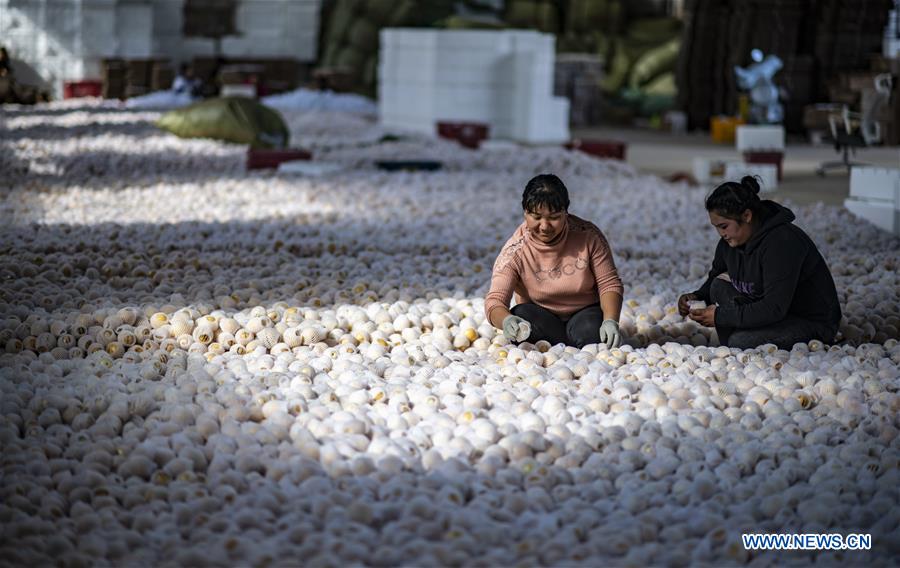
A villager carries pepino melon seedlings at a pepino melon seedling center in Luhua Village of Xijiekou Township in Shilin Yi Autonomous County, southwest China's Yunnan Province, November 30, 2019. Rows of shrubs bearing pepino melons spread over the stony desert in Luhua Village in southwest China's Yunnan. It is the outcomes for locals to fight against the harsh environment and a success to lead a better life. On this stony desert in Luhua Village, it was hard to grow crops in the past. Locals chose to plant the pepino melon which is suitable for the land here and wished to have a good sale. But the pepino melon originated from South America was unknown to most of the Chinese customers. No one bought the fruit after the harvest. Good news came and the situation has changed since the end of 2015. Promotions, part of the poverty alleviation campaign, were rolled out to help raise the popularity and sales of the fruit. This fruit, with a mixed flavor of honeydew and cucumber, is rich in nutrition. And it is recognized gradually by the Chinese who pay attention to their diet. Up to date, pepino melon planting area in Xijiekou Town has reached to 4800 hectares, with more than 4,000 families involved in this industry. The pepino melon planting industry has helped 67 poverty-stricken households increase their income. The products are sold to big cities like Beijing, Shanghai, Shenzhen and Hong Kong. [Xinhua/Lai Xiangdong]

Villagers pack pepino melons at a farmers' specialized cooperative in Luhua Village of Xijiekou Township in Shilin Yi Autonomous County, southwest China's Yunnan Province, November 30, 2019. Rows of shrubs bearing pepino melons spread over the stony desert in Luhua Village in southwest China's Yunnan. It is the outcomes for locals to fight against the harsh environment and a success to lead a better life. On this stony desert in Luhua Village, it was hard to grow crops in the past. Locals chose to plant the pepino melon which is suitable for the land here and wished to have a good sale. But the pepino melon originated from South America was unknown to most of the Chinese customers. No one bought the fruit after the harvest. Good news came and the situation has changed since the end of 2015. Promotions, part of the poverty alleviation campaign, were rolled out to help raise the popularity and sales of the fruit. This fruit, with a mixed flavor of honeydew and cucumber, is rich in nutrition. And it is recognized gradually by the Chinese who pay attention to their diet. Up to date, pepino melon planting area in Xijiekou Town has reached to 4800 hectares, with more than 4,000 families involved in this industry. The pepino melon planting industry has helped 67 poverty-stricken households increase their income. The products are sold to big cities like Beijing, Shanghai, Shenzhen and Hong Kong. [Xinhua/Hu Chao]

Villager Li Chunmei ckecks pepino melon seedlings at a pepino melon seedling center in Luhua Village of Xijiekou Township in Shilin Yi Autonomous County, southwest China's Yunnan Province, November 30, 2019. Rows of shrubs bearing pepino melons spread over the stony desert in Luhua Village in southwest China's Yunnan. It is the outcomes for locals to fight against the harsh environment and a success to lead a better life. On this stony desert in Luhua Village, it was hard to grow crops in the past. Locals chose to plant the pepino melon which is suitable for the land here and wished to have a good sale. But the pepino melon originated from South America was unknown to most of the Chinese customers. No one bought the fruit after the harvest. Good news came and the situation has changed since the end of 2015. Promotions, part of the poverty alleviation campaign, were rolled out to help raise the popularity and sales of the fruit. This fruit, with a mixed flavor of honeydew and cucumber, is rich in nutrition. And it is recognized gradually by the Chinese who pay attention to their diet. Up to date, pepino melon planting area in Xijiekou Town has reached to 4800 hectares, with more than 4,000 families involved in this industry. The pepino melon planting industry has helped 67 poverty-stricken households increase their income. The products are sold to big cities like Beijing, Shanghai, Shenzhen and Hong Kong. [Xinhua/Jiang Wenyao]

Villager Zhang Jianwei carries pepino melons at a farmers' specialized cooperative in Luhua Village of Xijiekou Township in Shilin Yi Autonomous County, southwest China's Yunnan Province, November 30, 2019. Rows of shrubs bearing pepino melons spread over the stony desert in Luhua Village in southwest China's Yunnan. It is the outcomes for locals to fight against the harsh environment and a success to lead a better life. On this stony desert in Luhua Village, it was hard to grow crops in the past. Locals chose to plant the pepino melon which is suitable for the land here and wished to have a good sale. But the pepino melon originated from South America was unknown to most of the Chinese customers. No one bought the fruit after the harvest. Good news came and the situation has changed since the end of 2015. Promotions, part of the poverty alleviation campaign, were rolled out to help raise the popularity and sales of the fruit. This fruit, with a mixed flavor of honeydew and cucumber, is rich in nutrition. And it is recognized gradually by the Chinese who pay attention to their diet. Up to date, pepino melon planting area in Xijiekou Town has reached to 4800 hectares, with more than 4,000 families involved in this industry. The pepino melon planting industry has helped 67 poverty-stricken households increase their income. The products are sold to big cities like Beijing, Shanghai, Shenzhen and Hong Kong. [Xinhua/Hu Chao]

Villager Li Chunmei trims pepino melon seedlings at a pepino melon seedling center in Luhua Village of Xijiekou Township in Shilin Yi Autonomous County, southwest China's Yunnan Province, November 30, 2019. Rows of shrubs bearing pepino melons spread over the stony desert in Luhua Village in southwest China's Yunnan. It is the outcomes for locals to fight against the harsh environment and a success to lead a better life. On this stony desert in Luhua Village, it was hard to grow crops in the past. Locals chose to plant the pepino melon which is suitable for the land here and wished to have a good sale. But the pepino melon originated from South America was unknown to most of the Chinese customers. No one bought the fruit after the harvest. Good news came and the situation has changed since the end of 2015. Promotions, part of the poverty alleviation campaign, were rolled out to help raise the popularity and sales of the fruit. This fruit, with a mixed flavor of honeydew and cucumber, is rich in nutrition. And it is recognized gradually by the Chinese who pay attention to their diet. Up to date, pepino melon planting area in Xijiekou Town has reached to 4800 hectares, with more than 4,000 families involved in this industry. The pepino melon planting industry has helped 67 poverty-stricken households increase their income. The products are sold to big cities like Beijing, Shanghai, Shenzhen and Hong Kong. [Xinhua/Hu Chao]

Villagers sort pepino melons at a farmers' specialized cooperative in Luhua Village of Xijiekou Township in Shilin Yi Autonomous County, southwest China's Yunnan Province, November 30, 2019. Rows of shrubs bearing pepino melons spread over the stony desert in Luhua Village in southwest China's Yunnan. It is the outcomes for locals to fight against the harsh environment and a success to lead a better life. On this stony desert in Luhua Village, it was hard to grow crops in the past. Locals chose to plant the pepino melon which is suitable for the land here and wished to have a good sale. But the pepino melon originated from South America was unknown to most of the Chinese customers. No one bought the fruit after the harvest. Good news came and the situation has changed since the end of 2015. Promotions, part of the poverty alleviation campaign, were rolled out to help raise the popularity and sales of the fruit. This fruit, with a mixed flavor of honeydew and cucumber, is rich in nutrition. And it is recognized gradually by the Chinese who pay attention to their diet. Up to date, pepino melon planting area in Xijiekou Town has reached to 4800 hectares, with more than 4,000 families involved in this industry. The pepino melon planting industry has helped 67 poverty-stricken households increase their income. The products are sold to big cities like Beijing, Shanghai, Shenzhen and Hong Kong. [Xinhua/Jiang Wenyao]
(Source: Xinhua)

